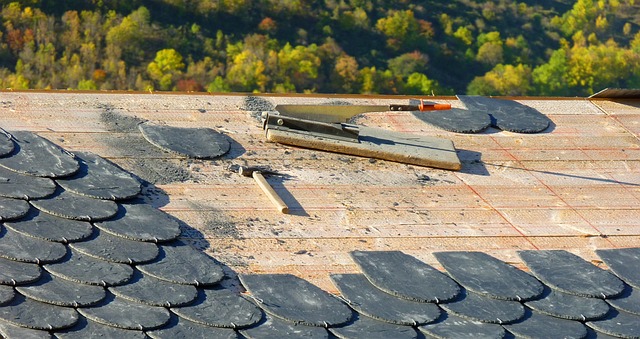Roofers must be well-versed in local building codes and regulations to execute roofing projects safely and compliantly. These codes, which prioritize public safety, property protection, and structural integrity, guide the selection of materials, slope, pitch, and other design elements. Proficiency in these codes is not just about avoiding penalties; it's about optimizing designs for better safety and functionality. Staying current with local building codes is essential for roofers to perform their work confidently, meeting stringent safety standards and client expectations while adhering to industry best practices.
Professional roofers are critical in ensuring that all aspects of a roofing project comply with these regulations, from material selection to structural integrity checks. They must obtain necessary permits, pass inspections, and integrate fire resistance, wind load considerations, and energy efficiency standards into their work. Their expertise ensures the longevity and safety of a building's roofing system, protecting homeowners from legal complications and maintaining code compliance to mitigate risks.
The process of ensuring a compliant roof involves a detailed inspection by an experienced roofer, comparing the existing or planned roof against code requirements. The roofer addresses any discrepancies with a comprehensive plan that ensures the roof meets all necessary criteria, including material selection and design for load and slope. Throughout the project, the roofer's expertise is crucial in navigating these legal requirements, ensuring both structural integrity and compliance at every stage of construction.
Obtaining building permits is a non-negotiable step in the roofing process, as these documents ensure that all construction aligns with established building codes and regulations. A knowledgeable roofer understands the importance of these permits in preventing legal issues and financial losses due to non-compliance. The permit process involves a thorough examination by local authorities to assess safety, structural soundness, and zoning compliance. This oversight is vital for upholding public safety standards and can strengthen a property owner's case in disputes or legal proceedings. Therefore, selecting an experienced roofer adept at handling permit procedures is essential for ensuring code-compliant standards and providing peace of mind throughout the roofing project.
When embarking on a roofing project, adherence to local building codes is not just a procedural step but a critical safeguard ensuring structural integrity and safety. This article delves into the intricacies of maintaining compliance with these regulations, from the significance of professional roofers’ expertise to the nuances of green building standards that shape modern roofing practices. We explore key steps for achieving code-compliant roof installations, the importance of building permits, and the legal ramifications of non-compliance. Additionally, we examine how technology and innovation are transforming the industry to meet these demands. Homeowners will find valuable tips on navigating compliance, while case studies highlight real-world solutions to code compliance challenges. Understanding local building codes is a cornerstone in any roofing venture, ensuring both legal and functional excellence.
- Understanding Local Building Codes and Their Impact on Roofing Projects
- The Role of Professional Roofers in Code Compliance
- Key Steps to Ensure Your Roof Meets Building Code Standards
- Importance of Building Permits for Residential and Commercial Roofing
- How to Conduct a Code-Compliant Roof Inspection
Understanding Local Building Codes and Their Impact on Roofing Projects

When embarking on a roofing project, it is imperative for roofers to have an in-depth understanding of local building codes and regulations. These codes are established by municipalities to ensure public safety, protect property, and maintain the integrity of structures within their jurisdiction. Roofers must be adept at interpreting these codes, which can dictate everything from materials used to the slope and pitch of a roof design. Non-compliance not only risks project delays but also costly revisions or legal action. A thorough familiarity with these guidelines is crucial for roofers to execute their work effectively and efficiently. This understanding is not just about adherence; it’s also about leveraging the codes to optimize design and functionality, ultimately delivering a safer and more durable structure for clients. The impact of local building codes on roofing projects cannot be overstated, as they serve as a framework that guides professionals in the industry to deliver high-quality work that meets both safety standards and client expectations. Roofers who stay abreast of these regulations can navigate complex projects with confidence, ensuring each project is not only compliant but also exemplifies best practices in the field.
The Role of Professional Roofers in Code Compliance

When embarking on any roofing project, it is imperative that professional roofers adhere to local building codes and regulations to ensure safety, durability, and compliance. These experts are well-versed in the specifications set forth by authoritative bodies, which govern everything from material selection to the structural integrity of the installation. Their role extends beyond mere repair or replacement; they must understand and apply the nuances of these codes, which include but are not limited to fire resistance requirements, wind load considerations, and energy efficiency standards. By integrating these elements into their work, professional roofers contribute significantly to the overall safety and longevity of a building’s roofing system. Moreover, they play a pivotal role in obtaining the necessary permits and inspections, ensuring that every aspect of the project meets the stringent criteria set by local regulations. This due diligence not only safeguards homeowners from potential legal issues but also guarantees that their property remains up to code, reducing risks associated with structural failure or non-compliance penalties. The expertise of professional roofers in navigating these codes is invaluable, as it combines technical knowledge with a commitment to maintaining the highest standards in the industry.
Key Steps to Ensure Your Roof Meets Building Code Standards

To guarantee that your roof adheres to local building code standards, it’s imperative to collaborate closely with a knowledgeable roofer who is well-versed in the specific regulations that apply to your region. The first step involves obtaining a comprehensive understanding of the relevant codes and regulations from your local municipality or building department. These documents outline the minimum requirements for roofing systems, including materials, design, and installation practices that must be followed. A roofer with expertise in these standards can interpret the code language, ensuring that every aspect of your roof’s construction is compliant.
Once the applicable codes are identified, a roofer will conduct an inspection of your existing roof or the site where the new roof will be installed. This assessment will pinpoint any discrepancies between the current structure and the required standards. The roofer will then outline a detailed plan that addresses these discrepancies, which may include selecting appropriate materials, designing the roof to meet load and slope requirements, and implementing proper ventilation systems to comply with energy efficiency regulations. Throughout the project, the roofer will serve as your guide, ensuring that each phase of work is completed in accordance with building codes, thereby safeguarding both the structural integrity of your roof and your legal compliance.
Importance of Building Permits for Residential and Commercial Roofing

When embarking on any roofing project, whether for residential or commercial properties, it is imperative to secure the necessary building permits. These permits are not mere formalities; they serve as a legal endorsement ensuring that all construction adheres to local building codes and regulations. A seasoned roofer will attest to the critical role these permits play in safeguarding property owners from potential legal complications and financial losses due to non-compliance. Obtaining a permit initiates a process of scrutiny by local authorities, who review plans for safety, structural integrity, and compliance with zoning laws. This rigorous examination protects the public interest by preventing substandard work that could compromise building safety. Moreover, in the event of disputes or legal challenges, having the correct permits can substantiate a property owner’s position, facilitating smoother resolutions. Therefore, engaging a roofer who is well-versed in navigating the permit process is essential for any roofing venture, ensuring peace of mind and adherence to the legal framework governing construction projects.
How to Conduct a Code-Compliant Roof Inspection

When conducting a code-compliant roof inspection, it’s imperative to engage a seasoned roofer who possesses an intricate understanding of local building codes and regulations. This professional will meticulously examine the roof structure, materials, and installation to verify adherence to safety standards and performance expectations. The roofer should be adept at identifying any discrepancies that may affect the integrity of the roof, such as improper sealing, insufficient support structures, or substandard materials. During the inspection, the roofer will assess the condition of flashing, gutters, and other critical components, ensuring they are correctly installed to prevent water intrusion and subsequent damage.
To ensure a thorough inspection, the roofer will utilize specialized tools and techniques tailored to detect issues that may not be visible from the ground. This includes examining the roof’s underlayment, ventilation systems, and drainage paths for signs of wear or potential blockages. The roofer will also check for adequate insulation and proper ventilation to maintain energy efficiency and extend the lifespan of the roof. By conducting a detailed inspection and documenting findings, the roofer can provide property owners with a comprehensive report outlining any non-compliant issues and recommendations for corrective actions to achieve full compliance with local building codes and regulations.
In wrapping up our exploration of the critical intersection between local building codes and residential and commercial roofing projects, it’s clear that adherence to these regulations is not merely a box-ticking exercise but a cornerstone of safety and quality in construction. Professional roofers play an indispensable role in this process, ensuring compliance through meticulous attention to the specific requirements set forth by building codes. By following the outlined steps for code-compliant projects, property owners can rest assured that their investment is protected and that their buildings stand secure against environmental challenges. Remember, engaging a knowledgeable roofer who understands these standards is key to safeguarding both the structural integrity of the roof and the legal compliance of the project. With the right expertise and approach, your roofing endeavors will not only withstand the test of time but also pass inspections with confidence.



